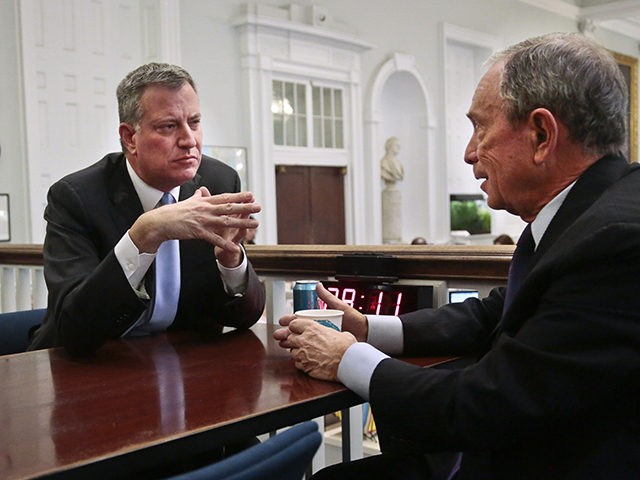Former New York City Mayor Mike Bloomberg accused his successor, Bill de Blasio, of being racist for running a campaign prominently featuring the latter’s interracial family.
In August 2013, as his tenure in city hall was winding to a close, Bloomberg sat down for an in-depth interview with the New Yorker.
Amid reflecting on his accomplishments, Bloomberg was asked about the race to succeed him, which was then unfolding. The mayor, in particular, was questioned whether de Blasio, one of his fiercest critics at the time, was running a campaign premised on “class-warfare,” given his frequent broadsides about economic inequality.
“Class-warfare and racist,” Bloomberg responded, before quickly attempting to clarify what he meant. “I mean he’s making an appeal using his family to gain support.”
“I think it’s pretty obvious to anyone watching what he’s been doing,” Bloomberg said of de Blasio, who is married to a black woman and has two interracial children. “I do not think he himself is racist. It’s comparable to me pointing out I’m Jewish in attracting the Jewish vote.”
At the time of Bloomberg’s criticism, de Blasio was emerging as the frontrunner for the Democratic mayoral nomination. His campaign was largely waged around ending the economic disparities between Manhattan and the outer boroughs. De Blasio also benefited from a strong public backlash to Bloomberg’s policing strategies.
Most notably, de Blasio’s pledge to reform the Bloomberg administration’s stop-and-frisk policy caught the attention of minority voters across the city, many of whom felt personally victimized by law enforcement.
De Blasio’s stance on the topic was only reinforced by an ad campaign launched around the same time Bloomberg was sitting down with the New Yorker. In the ad, de Blasio’s then-15-year-old biracial son, Dante, promises his father’s commitment to ending “the stop-and-frisk era” was more than just political rhetoric.
Bloomberg, however, seemed to disagree. While trying to explain why he viewed the campaign as “racist” to the New Yorker, the mayor seemed to imply de Blasio was just saying what people wanted to hear.
“You tailor messages to your audiences and address issues you think your audience cares about,” Bloomberg said, proceeding to admit he was uncomfortable with what he saw as de Blasio’s attempts to sow “division.”
“His whole campaign is that there are two different cities here,” the mayor said. “The way to help those who are less fortunate is, number one, to attract more very fortunate people. They are the ones that pay the bills.”
“It’s a destructive strategy for those you want to help the most,” he added. “He’s a very populist, very left-wing guy, but this city is not two groups, and if to some extent it is, it’s one group paying for services for the other.”
When Bloomberg’s interview with the New Yorker was eventually published in September 2013 it drew widespread rebuke, but from none more so than Chirlane McCray, de Blasio’s wife.
“Do I look like an inanimate object or a tool?”McCray told reporters when she and her husband were confronted about Bloomberg’s comments. “I walk, I talk, I make my own decisions.”
Bloomberg’s criticism of de Blasio come back into the spotlight as the former mayor is under fire after audio resurfaced from a speech he gave at the Aspen Institute in 2015. In his remarks to the mostly white gathering, Bloomberg defended “stop-and-frisk” in words that can only be described as racially charged.
“It’s controversial, but … 95 percent of your murders, and murderers, and murder victims fit one [description],” he is heard to say on the audio. “You can just take the description, Xerox it, and pass it out to all of the cops. They are male, minorities, 15 to 25. That’s true in New York, it’s true in virtually every city in America.”

COMMENTS
Please let us know if you're having issues with commenting.